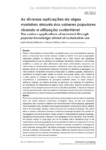Mostrar o rexistro simple do ítem
As diversas aplicações de algas marinhas através dos saberes populares visando a utilização sustentável
| dc.contributor.author | Daniela Mallmann, Leisle | |
| dc.contributor.author | Dalosto Jahno, Vanusca | |
| dc.date.accessioned | 2019-03-21T12:47:58Z | |
| dc.date.available | 2019-03-21T12:47:58Z | |
| dc.date.issued | 2015 | |
| dc.identifier.citation | Ambientalmente Sustentable, 2015, 20: 1841-1856. ISSN: 1887-2417 | es_ES |
| dc.identifier.issn | 1887-2417 | |
| dc.identifier.uri | http://hdl.handle.net/2183/22318 | |
| dc.description.abstract | [Resumo] Frente à crise ambiental contemporânea a sociedade passa a ver a necessidade de repensar sobre a conservação dos recursos naturais. Através da história vê-se que as populações tradicionais possuem um sistema de relações com o meio natural mais apropriado ecologicamente do que os adotados na atualidade. Precisamos incentivar a comunidade acadêmica a adotar um olhar diferenciado para estes conhecimentos, buscando uma mescla entre os conhecimentos populares e acadêmicos. Este artigo busca apresentar um exemplo teórico de conhecimento tradicional convertido em benefícios à população e ao meio ambiente. Inicialmente buscamos contextualizar os saberes populares, destacando a importância do resgate destes saberes no âmbito da educação formal. Após mostramos o saber popular da utilização de algas e, finalizamos com um estudo teórico sobre as características e possibilidades de aplicações existentes destas no nosso cotidiano. Verifica-se emprego na indústria alimentar, na agricultura, em empresas de cosméticos, em biomateriais, em tratamentos de esgoto e água, entre outros. Devemos incentivar uma educação crítica, dialógica e que promova uma consciência planetária. O resgate às crenças e culturas populares pode e deve nos despertar curiosidade e ser promotor de conhecimentos, pois dessa forma as chances de êxito na sustentabilidade dos recursos são aumentadas. | es_ES |
| dc.description.abstract | [Abstract] Front of the contemporary environmental crisis, society passed to see the need for rethinking about the natural resource conservation. Throughout history we see that traditional populations have a system of relations with the environment most ecologically appropriate than the adopted today. We need to encourage the academic community to adopt a different look to this knowledge, seeking a blend of popular and academic knowledge. This article seeks to present a theoretical example of traditional knowledge translated into benefits for the population and the environment. Initially we seek to contextualize the popular knowledge, highlighting the importance of rescue of this knowledge in formal education. After we show the popular wisdow of using algae and will be finalized with a theoretical study of the characteristics and existing applications and possibilities of these in our daily lives. It is found employment in food industry, agriculture, cosmetic companies, biomaterials, in sewage and water treatment, among others. We should encourage a critical education, dialogue and to promote a planetary consciousness. The rescue beliefs and popular culture can and must arouse curiosity and be promoter of knowledge, because that way the chances of success in the sustainability of resources are increased. | es_ES |
| dc.language.iso | por | es_ES |
| dc.publisher | Universidade da Coruña, Servizo de Publicacións | es_ES |
| dc.rights | Atribución-CompartirIgual 3.0 España | es_ES |
| dc.rights.uri | http://creativecommons.org/licenses/by-sa/3.0/es/ | * |
| dc.subject | Saber tradicional | es_ES |
| dc.subject | Conhecimento científico | es_ES |
| dc.subject | Educação | es_ES |
| dc.subject | Alga | es_ES |
| dc.subject | Ficocolóides | es_ES |
| dc.subject | Traditional Knowledge | es_ES |
| dc.subject | Scientific knowledge | es_ES |
| dc.subject | Education | es_ES |
| dc.subject | Phycocolloids | es_ES |
| dc.title | As diversas aplicações de algas marinhas através dos saberes populares visando a utilização sustentável | es_ES |
| dc.title.alternative | The various applications of seaweed through popular knowledge aimed at sustainable use | es_ES |
| dc.type | info:eu-repo/semantics/article | es_ES |
| dc.rights.access | info:eu-repo/semantics/openAccess | es_ES |
| UDC.journalTitle | AmbientalMente Sustentable: Revista científica galego-lusófona de educación ambiental | es_ES |
| UDC.volume | 20 | es_ES |
| UDC.startPage | 1841 | es_ES |
| UDC.endPage | 1856 | es_ES |
| dc.identifier.doi | https://doi.org/10.17979/ams.2015.02.020.1702 |






